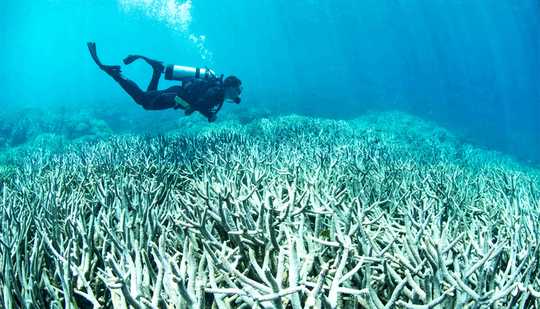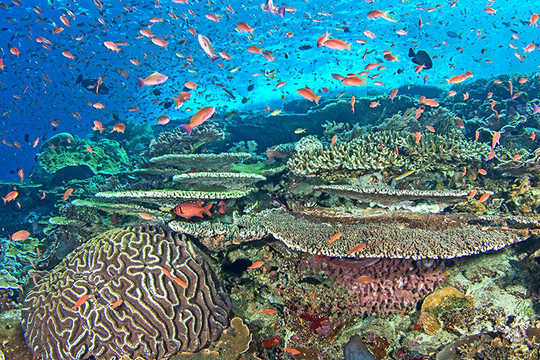
A diver explores a coral reef that has experienced bleaching. (Credit: The Ocean Agency)
Management that takes evolution and adaptation into account can help rescue coral reefs from the effects of climate change, according to a new study.
Importantly, the results show that by making smart decisions to protect reefs today, conservation managers can generate the conditions that can help corals adapt to rising temperatures.
“It is well documented that climate change is causing corals to die off at an unprecedented rate, but our study provides tools that offer promise for their survival,” says coauthor Madhavi Colton, program director at the nonprofit Coral Reef Alliance. “Our results show that when evolution is enabled, conservation efforts can help corals adapt to rising temperatures.”
 A healthy reef in Indonesia teems with life. (Credit: Michael Webster/Coral Reef Alliance)
A healthy reef in Indonesia teems with life. (Credit: Michael Webster/Coral Reef Alliance)
Saving coral reefs from climate change
Contrary to approaches that are popular today, such as focusing protection on reefs in cooler water, the study shows that protecting diverse reef habitat types across a spectrum of ocean conditions is key to helping corals adapt to climate change.
“We found that a diversity of reef types provides the variety that evolution depends on,” says coauthor Malin Pinsky, an associate professor at Rutgers University. “Hot sites are important sources of heat-tolerant corals, while cold sites and those in between can become important future habitats. Together, a diversity of reef types act as stepping stones that give corals the best chance for adapting and moving as climate changes.”
 A green sea turtle passes through a cleaning station in Hawaii, where a Coral Reef Alliance initiative is working with local partners to improve water quality throughout the state. (Credit: Michael Webster/Coral Reef Alliance)
A green sea turtle passes through a cleaning station in Hawaii, where a Coral Reef Alliance initiative is working with local partners to improve water quality throughout the state. (Credit: Michael Webster/Coral Reef Alliance)
Key to successful evolution is management that improves local conditions for reefs by effectively reducing local stressors, such as overfishing and water pollution. However, the authors caution that not all management strategies are created equal.
“We used mathematical models to test the effects of management choices on coral reef outlooks,” says lead author Tim Walsworth, a postdoctoral researcher at the School of Aquatic and Fishery Sciences at the University of Washington.
 A coral reef in Roatan, Honduras, is reflected in the surface of the water above. (Credit: Michael Webster/Coral Reef Alliance)
A coral reef in Roatan, Honduras, is reflected in the surface of the water above. (Credit: Michael Webster/Coral Reef Alliance)
“We found that corals in well-managed areas act as a source of baby corals in the future, essentially rescuing reefs after the climate stabilizes. Without both evolution and management, the corals in our model were unable to survive rising temperatures.”
Time to act
Coral reefs are one of the most diverse ecosystems on the planet and support the livelihoods of over 500 million people. Globally, they are estimated to be worth $375 billion per year.
The study shows that managing reefs to facilitate evolution today and in the future can enhance their prospects for long-term survival. This means creating managed area networks that contain a diversity of coral types and habitats and effectively reduce local stressors.
“This study shows that we know enough of the science to act—and with the effects of climate change only increasing, we have little time to waste,” Colton says.
The study appears in Nature Climate Change.
The study is the result of a collaborative research program Colton and Michael Webster of the Coral Reef Alliance launched. Additional coauthors and project collaborators came from the University of Washington, Stanford University, and the University of Queensland. Funding for the research came from the Gordon and Betty Moore Foundation.
Source: Coral Reef Alliance via University of Washington
Related Books
Climate Adaptation Finance and Investment in California
by Jesse M. Keenan This book serves as a guide for local governments and private enterprises as they navigate the unchartered waters of investing in climate change adaptation and resilience. This book serves not only as a resource guide for identifying potential funding sources but also as a roadmap for asset management and public finance processes. It highlights practical synergies between funding mechanisms, as well as the conflicts that may arise between varying interests and strategies. While the main focus of this work is on the State of California, this book offers broader insights for how states, local governments and private enterprises can take those critical first steps in investing in society’s collective adaptation to climate change. Available On Amazon
This book serves as a guide for local governments and private enterprises as they navigate the unchartered waters of investing in climate change adaptation and resilience. This book serves not only as a resource guide for identifying potential funding sources but also as a roadmap for asset management and public finance processes. It highlights practical synergies between funding mechanisms, as well as the conflicts that may arise between varying interests and strategies. While the main focus of this work is on the State of California, this book offers broader insights for how states, local governments and private enterprises can take those critical first steps in investing in society’s collective adaptation to climate change. Available On Amazon
Nature-Based Solutions to Climate Change Adaptation in Urban Areas: Linkages between Science, Policy and Practice
by Nadja Kabisch, Horst Korn, Jutta Stadler, Aletta Bonn This open access book brings together research findings and experiences from science, policy and practice to highlight and debate the importance of nature-based solutions to climate change adaptation in urban areas. Emphasis is given to the potential of nature-based approaches to create multiple-benefits for society.
This open access book brings together research findings and experiences from science, policy and practice to highlight and debate the importance of nature-based solutions to climate change adaptation in urban areas. Emphasis is given to the potential of nature-based approaches to create multiple-benefits for society.
The expert contributions present recommendations for creating synergies between ongoing policy processes, scientific programmes and practical implementation of climate change and nature conservation measures in global urban areas. Available On Amazon
A Critical Approach to Climate Change Adaptation: Discourses, Policies and Practices
by Silja Klepp, Libertad Chavez-Rodriguez This edited volume brings together critical research on climate change adaptation discourses, policies, and practices from a multi-disciplinary perspective. Drawing on examples from countries including Colombia, Mexico, Canada, Germany, Russia, Tanzania, Indonesia, and the Pacific Islands, the chapters describe how adaptation measures are interpreted, transformed, and implemented at grassroots level and how these measures are changing or interfering with power relations, legal pluralismm and local (ecological) knowledge. As a whole, the book challenges established perspectives of climate change adaptation by taking into account issues of cultural diversity, environmental justicem and human rights, as well as feminist or intersectional approaches. This innovative approach allows for analyses of the new configurations of knowledge and power that are evolving in the name of climate change adaptation. Available On Amazon
This edited volume brings together critical research on climate change adaptation discourses, policies, and practices from a multi-disciplinary perspective. Drawing on examples from countries including Colombia, Mexico, Canada, Germany, Russia, Tanzania, Indonesia, and the Pacific Islands, the chapters describe how adaptation measures are interpreted, transformed, and implemented at grassroots level and how these measures are changing or interfering with power relations, legal pluralismm and local (ecological) knowledge. As a whole, the book challenges established perspectives of climate change adaptation by taking into account issues of cultural diversity, environmental justicem and human rights, as well as feminist or intersectional approaches. This innovative approach allows for analyses of the new configurations of knowledge and power that are evolving in the name of climate change adaptation. Available On Amazon
From The Publisher:
Purchases on Amazon go to defray the cost of bringing you InnerSelf.comelf.com, MightyNatural.com, and ClimateImpactNews.com at no cost and without advertisers that track your browsing habits. Even if you click on a link but don't buy these selected products, anything else you buy in that same visit on Amazon pays us a small commission. There is no additional cost to you, so please contribute to the effort. You can also use this link to use to Amazon at any time so you can help support our efforts.


























